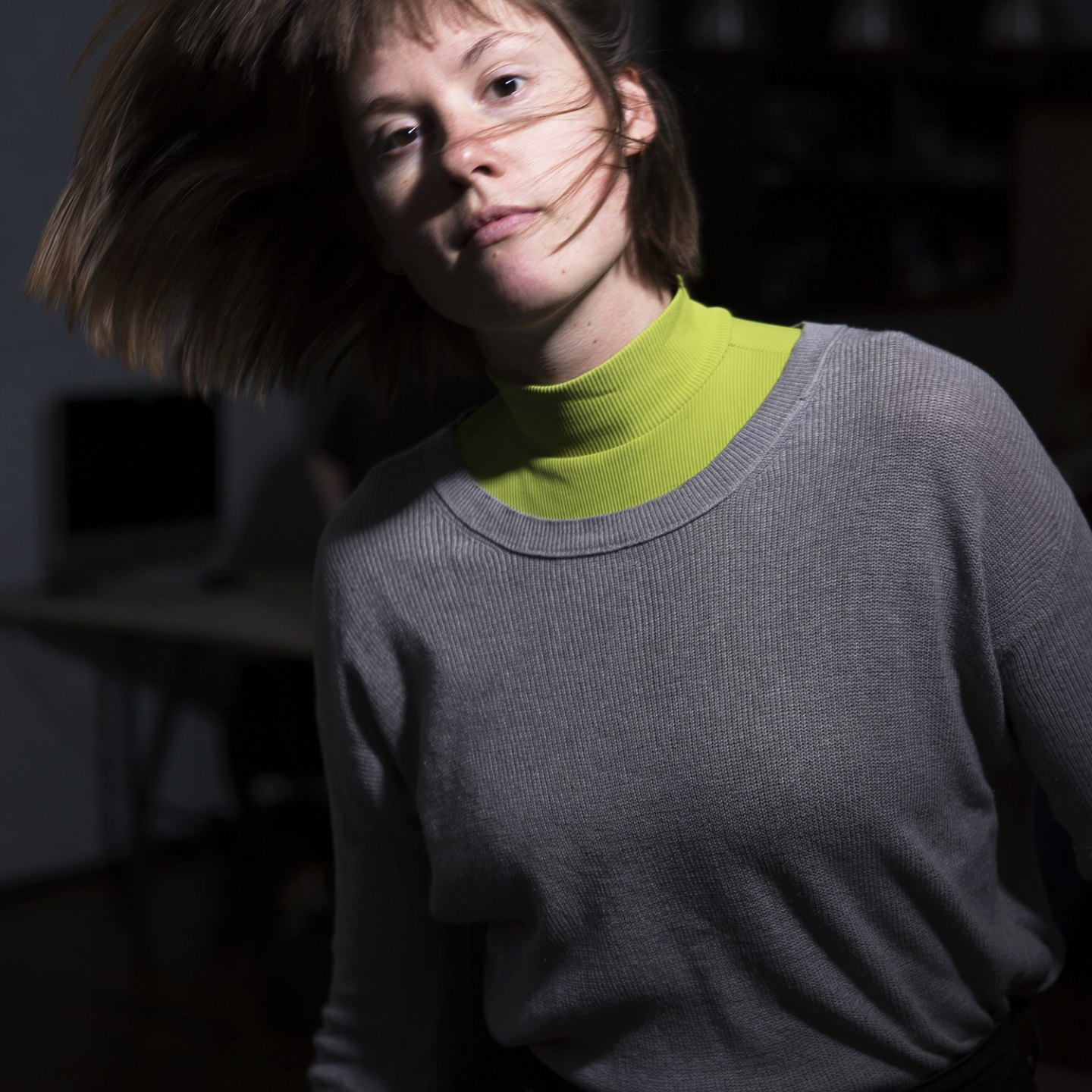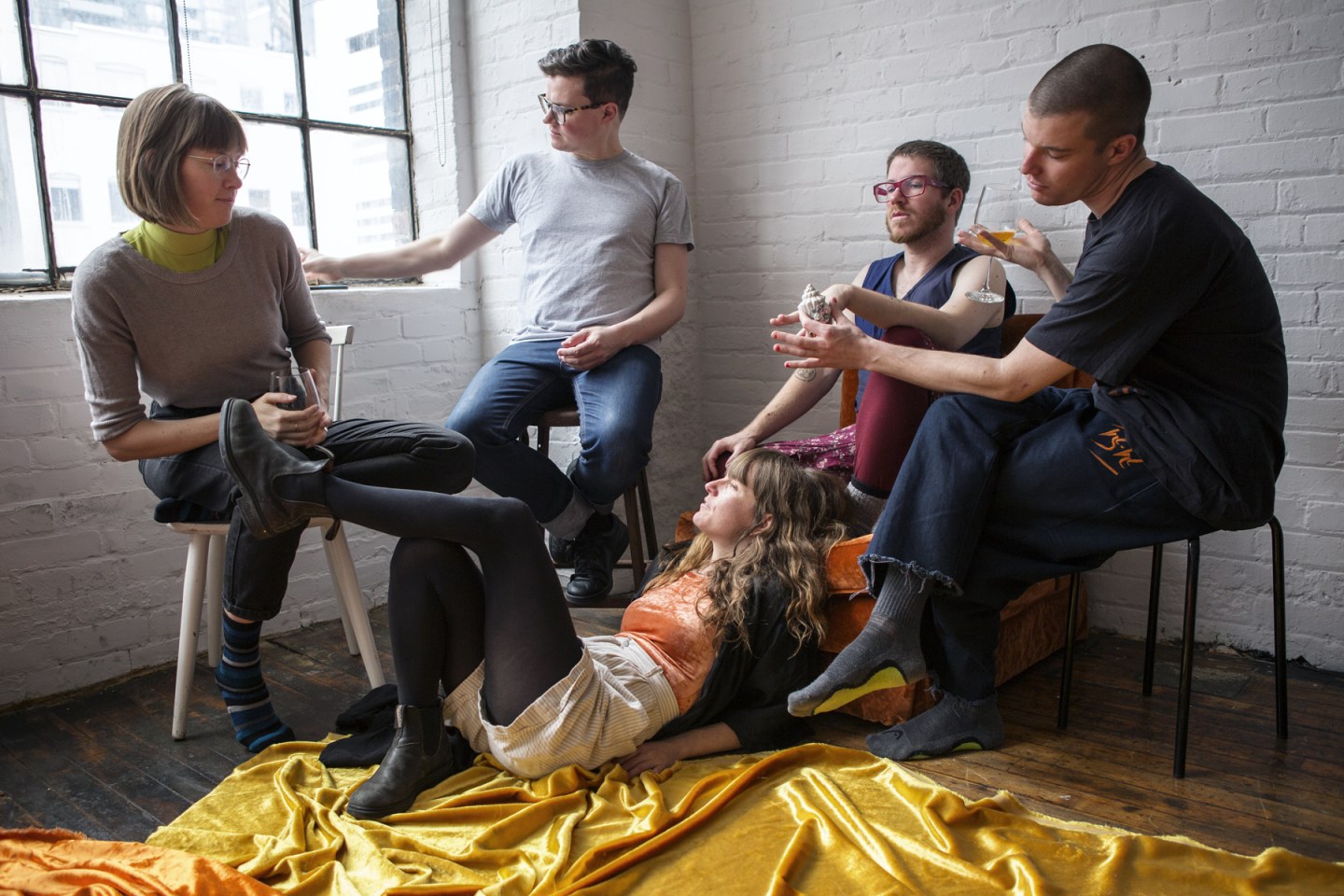 Robin Dann.
Claire Harvie
Robin Dann.
Claire Harvie
Not long after I interviewed Robin Dann, the bandleader and songwriter behind the Toronto-based playful pop project Bernice, I got to see them perform in a cozy underground venue. There was a lot to admire — the skronky and gentle reinterpretations of songs from their album Puff LP: In the air without a shape, the Mad Lib that Dann generated between songs with shouted suggestions from the audience, and the moment when she handed out bubble bottles and wands for the audience to blow (that was inspired, she said, by a scene from Disney’s Cinderella). But one of the most gratifying moments came near the end of the set: “This is our ‘final song,’” Dann said, throwing up scare quotes and mild disdain at the self-indulgence of an encore, which of course would come.
Nothing about Bernice is artificial. After completing a four year university degree in jazz, Dann moved to Paris to teach English. “I didn’t feel inspired to keep writing,” she told me as we sat outside of coffee shop in a brisk spring day. “I didn’t feel like I could move forward as a performer playing jazz.” Seeking the connection of her friends in Toronto, she returned in early 2011 and began writing with her current bandmates, Thom Gill and Dan Fortin (Felicity Williams and Phil Melanson came on board later). In September of that year, the band released its still-fantastic debut album what was that, and Dann was off to London for a master’s program in creative performance. “I did a bunch of courses in composition and ethnomusicology and performance, just trying different things,” she says.
Her jet-setting curiosity is central to Bernice and helps define this year’s LP. An expansion of 2017’s Puff EP, it contains a new version of the killer EP track “St. Lucia,” and six more songs of sedate and soulful hybrids of jazz, pop, noise, and R&B. Dann’s compositions, sketched on her computer and a few keyboards then fleshed out with the help of her bandmates, all hold strong individual souls. Dunn’s fantastical range covers a piercing portrait of depression (“David”), a giddy love song (“He’s The Moon”), and “Passenger Plane,” an everyday sight spun into an existential musing that sounds like early ’90s Prince from a gentler dimension. Trying to describe an aspect of the music is like chasing a firefly against a starry sky — each song is best experienced deeply, as a whole, with no distractions.
Two artists Dann admires right now are Micachu and Tirzah, who both, like her, are expanding notions of pop without any constraints. “They’re not afraid,” Dann says. “They’re just doing what they want to do.” What Dann wants to do is keep writing music, and prepare for Bernice’s upcoming tour; now that the band is signed to Arts & Crafts, Dann’s schedule is about to get a lot more hectic. Luckily, her music thrives on change.
 Bernice.
Photo by Claire Harvie
Bernice.
Photo by Claire Harvie
What drew you towards ethnomusicology when you were studying in London?
Music and culture are basically one and the same, so to listen and learn about music from other places is wonderful. I took a course in Brazilian music class, I took a Taiko drumming class, it’s just a joyful thing to learn about music from other places.
Do you remember the first time in your life that curiosity was piqued?
Probably hearing my brother play records in his room. When he started getting into bands like Smashing Pumpkins and Stone Temple Pilots, ten-year-old me was like “This is my music!” And then when friends of mine at school would show me, like The Miseducation of Lauryn Hill and Aaliyah, I was like “I wanna learn how to sing like that!” I would sing along and imitate them on the piano. I remember lifting an Alicia Keys song on the piano when I was like 12 or 13.
That was probably when I decided “I’m going to listen to music that I choose to listen to,” rather than just whatever happened to be playing in the house, because my parents played a lot of music in the house. A lot of [my musical taste] was informed by people whose opinions meant a lot to me, and from there I just carved my own path. What kind of music did you first get into?
I was going to wear my Korn Follow The Leader album shirt to this interview but I wasn’t sure what kind of first impression that might make.
[Laughs] Do you know the Toronto songwriter Ryan Driver? Sometimes when music comes on that he doesn’t really connect with, he’ll say “Do you ever feel like that?” That makes so much sense, because if you hear something and you love it, it’s not just that you love the music, you feel like that. You hear the sound, and you’re like “That’s me. I am in that, and I need to go be there again.”
“Sound can tell your brain what to do, and it’s nice that we can control that.”
Your latest project is effective at actualizing those spaces. How important is it for you make sure your songs have that immersion?
I feel like when I’m writing a song that’s what I’m doing. I’m trying to construct a bunch of words and melody and harmony and instrument, but ultimately what it turns into is a structure that has a bottom and top, a beginning and an end. There’s a feeling when it’s done that it’s something I can go into and know where all the walls are. There’s a mood and emotional energy that I can sign up for. I have to be able to sign up for it otherwise I won’t be able to play the song or listen to it and like it.
At the same time, there are these special moments that have a looseness, like the joyful ending of “Glue” where you’re naming different colors.
When we play [the outro] live, it’s the moment when I start to feel connected to everybody. It feels like people start to judge less and wake up a little bit more. It was actually collaboratively written by Felicity, Thom and I. We have a project called Bliss Gloss, a band we started to allow ourselves to write the songs that we would never let ourselves write for our main projects. They’re not jokes, but [we can] do the really cheesy thing, do the thing that sounds lifted from an R&B song from the 90s, or list colors and flowers. What it ended up showing me was that I like the songs just as much as the ones for my “real practice.” It’s actually all the same.
Was the nebulousness of your music something you approached consciously?
I think that I learned music in that way. That’s kind of what playing jazz is: you take a song that has existed since the ‘30s and you reinterpret it. Each time you play it, you find something new in it. I think we’ve all brought that spirit into this band. We’re uncomfortable doing the other thing which is writing a song, creating parts that are set, and always creating those set parts every time we say it. That feels more foreign to us, I think, than what we do, which evolves every time we play it live.
I often think about what makes a song a song. Because often people will cover something and take out all the harmony, put a new beat, maybe they’ll keep the melody, but somehow it still is that song. So it’s interesting to think how far you can take something without changing its heart, its spirit. Like “I Will Always Love You” was a Dolly Parton song before Whitney Houston, and it’s so good. Then you hear Whitney and it’s like, that’s where it was meant to go. But it’s the same song.
You’re an ASMR devotee. There’s your podcast, and I saw you perform a few years back as ASMR Budz. Can you tell me a little bit about your interest in it?
At first I thought [ASMR] was going to be completely separate from my music, but the more I get into it, the more I’m realizing that they’re so connected. I think it will keep being more and more so in my life. People are literally using sound to heal themselves of anxiety or insomnia, loneliness… I think that’s what people use music for too, in a lot of ways. It’s just such a functional thing, it’s not just entertainment. We just it on as a balm, or to trigger emotions we know we want to have. Sound can tell your brain what to do, and it’s nice that we can control that.